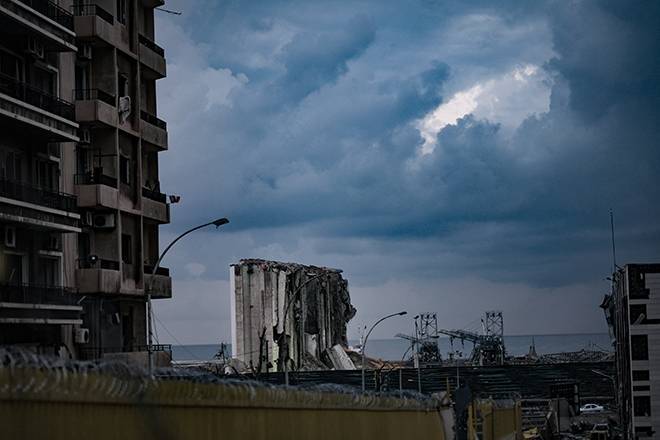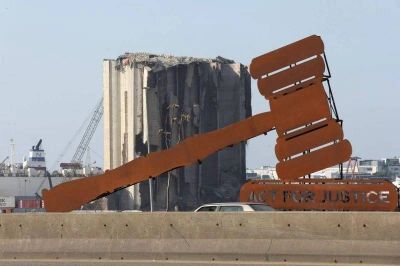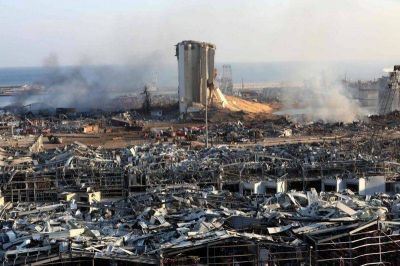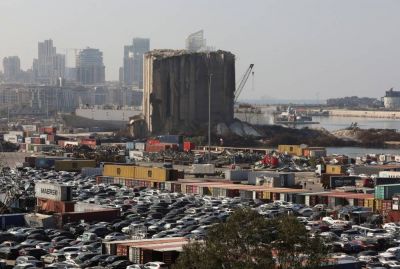
The silos at the Beirut port stand devastated in the aftermath of the Aug. 4, 2020 explosion. (Credit: João Sousa/L’Orient Today)
BEIRUT – Lebanese authorities confirmed Wednesday that a ship previously docked in the Beirut port — whose cargo raised alarm — is carrying non-explosive ammonium sulfate.
After the scare, acting Director of the Beirut port Amin Karkar was arrested, a judiciary source confirmed to L'Orient-Le Jour.
The cargo was confirmed to be ammonium sulfate after samples of the substance were analyzed by the Agricultural Scientific Research Service, the ministry's accredited laboratory.
According to the Ministry of Agriculture, the shipment belongs to NR&S Trading Co. and arrived in Beirut after traveling from Turkey. The shipment of ammonium sulfate, a type of fertilizer, initially caused concern for its similarity to ammonium nitrate— the substance that caused the deadly Aug. 4, 2020, Beirut port explosion.
This shipment is, in fact, "ammonium sulfate and not ammonium nitrate," the ministry added in its statement.
Ammonium sulfate "is not an explosive material in itself" and has low flammability, chemistry expert Naji Kodeih said to L'Orient-Le Jour.
The ship arrived Monday in the port of Beirut and then left the next day, port director Omar Itani and caretaker Agriculture Minister Abbas Hajj Hassan told L'Orient-Le Jour.
According to Itani, the ship arrived on Monday at the port of Beirut. The ship departed the port the next day, according to the official, though its next destination was unclear.
'We didn't want to take any chances'
The ship docked in Beirut two and a half years after the catastrophic Aug. 4, 2020, port explosion, triggered by the presence of hundreds of tons of ammonium nitrate that had been improperly stored since 2013.
"After what happened in August 2020, we didn't want to take any chances. So we took samples of the ship's cargo and refused to let it dock in the port any longer," Itani said.
A port official, requesting anonymity, told L'Orient-Le Jour that the ship allegedly tried unsuccessfully to dock in South Lebanon's Saida port. It was not clear why port authorities in Saida did not allow the ship to dock there.
Workers on the ship then asked to dock in the port of Beirut, which port management refused, according to the source.
The source explained that there were reports that the ship had suffered damage and needed maintenance for 10 days, which the port authorities refused.
Did the ship leave?
This information was also confirmed by caretaker Minister of Agriculture, Abbas Hajj Hassan, who spoke with L'Orient-Le Jour Tuesday evening. He explained that the ministry had recovered samples from the ship cargo to "ensure that there was no trace of ammonium nitrate."
The minister was however "not able to confirm" whether the ship left the port of Beirut, while the port source said the ship left a few hours after its arrival.
Arrest
Additionally, a judicial source raised concerns over the irregularity of the ship's docking in Beirut.
Earlier this week, Ghassan Khoury, the advocate general at the Court of Cassation, ordered customs to prohibit the ship from entering the port. But Karkar allowed its entry, likely in collusion with the shipowner and the shipping agent, according to the same source.
According to the source, Judge Khoury demanded that samples of the cargo be taken offshore, but his order was violated.
Karkar was arrested following his refusal to comply with the order. Omar Itani will also be questioned in connection with this case.
'Very low flammability'
According to Naji Kodeih, an expert in chemistry and toxicology, ammonium sulfate "is normally used as fertilizer."
"This material has very low flammability and is not an explosive material in itself," the expert told L'Orient-Le Jour.
Commenting on the potential for ammonium sulfate to explode if mixed with other materials, Kodeih explained that "any material mixed with an oxidizer can provoke an active reaction," whether it is ammonium sulfate or another component.
In November 2013, Lebanon allowed the Rhosus, a ship carrying ammonium nitrate from Georgia, to dock in Beirut. After the Rhosus was found to be defective, Lebanese port authorities seized 2,750 tons of ammonium nitrate and stored the material improperly in the port for years before part of the cargo exploded in 2020, killing more than 220 people and injuring thousands of others.
Mawlawi calls for 'necessary measures'
Reacting to the news of the arrival of the ship, caretaker Interior Minister Bassam Mawlawi said in a statement Tuesday evening that he called on authorities "to ascertain information about the entry, in the port of Beirut, of a ship containing dangerous and explosive materials," despite ammonium sulfate not being explosive.
"If this information is true, we ask that the necessary measures be put in place to prevent this boat from unloading its goods," Mawlawi added.


